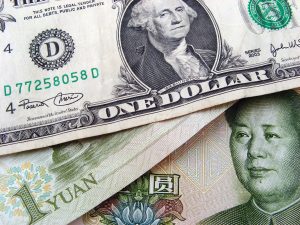The China-U.S. trade war highlighted a number of contentious issues between the China and the United States. One of these was the presence of Chinese subsidies to firms, which, according to Washington, creates an unlevel playing field for U.S. firms operating at home and in China. How much of a threat are such subsidies to U.S. competitiveness?
China provides subsidies to firms in sectors that are considered strategic. These include companies in the steel, solar panel manufacturing, electric battery development, ship building, and oil production industries. China focused government subsidies on the technology sector in its Made in China 2025 program. These subsidies have been said to reduce the competitiveness of U.S. firms, particularly small- and medium-sized enterprises, that are at a disadvantage in terms of cost.
Research on the performance of subsidy-receiving firms has been mixed. For example, government subsidies in the photovoltaic industry have been shown to increase innovation efficiency. In addition, some research has shown that government subsidies help to generate additional external finance in both state-owned and private firms, showing that there is not an ownership bias among external investors in placing funds in grant-funded firms. By contrast, other research reveals that subsidy-receiving firms may look more appealing because they have a lower cost of debt, even though their financial performance may not be better than those of other firms.
This research reveals that Chinese firms which receive subsidies may not necessarily be at an advantage compared to non-subsidy receiving firms, or at the least, that the results are mixed. In other words, it is not clear that subsidies always make firms better off than their rivals, although for some industries, such as the photovoltaic industry, such firms may display more efficiency in innovation.
Still, as it is possible that subsidies provide Chinese firms with a cost advantage over non-subsidized American firms, some measures should be taken to ensure equitable competition. Subsidies have become a political issue that has questioned the fairness of China’s economic model overall, in which the state protects industries that it views as strategic to its long-term economic security. Since political tensions between China and the U.S. have risen over the past five years, the subsidy issue needs to be addressed.
A two-pronged approach can be taken. One is to promote U.S. competitiveness. This can be done by improving the translation of scientific discoveries into manufactured products, protecting early-stage scientific research by situating it in the United States, training workers on new production processes, and inducing the U.S. government to purchase manufactured goods from American firms. These steps will help nurture American innovation and related production processes.
In addition, a way forward was suggested by the U.S., Europe, and Japan during the 2017 World Trade Organization (WTO) negotiations to counter distortions associated with subsidies, state-owned enterprises, and forced technology transfers. However, few concrete measures were initiated, leaving the issues open. Potential solutions were suggested by Elvire Fabry last year, which would expand the list of WTO-prohibited subsidies, reverse the burden of proof so that governments would have to prove that subsidies were not distortion-inducing, and improve notification of subsidies. These actions would provide an external means of enforcing just competition.
Going back to the opening question: Chinese subsidies do reduce costs for Chinese firms. While there is not a clear case that subsidies wildly threaten the competitiveness of U.S. companies, it appears probable that they create some distortions. This, coupled with the fact that Chinese subsidies have become such a lightning-rod political issue, means that the issue should be pursued both domestically within the U.S. and externally, within the WTO.
































